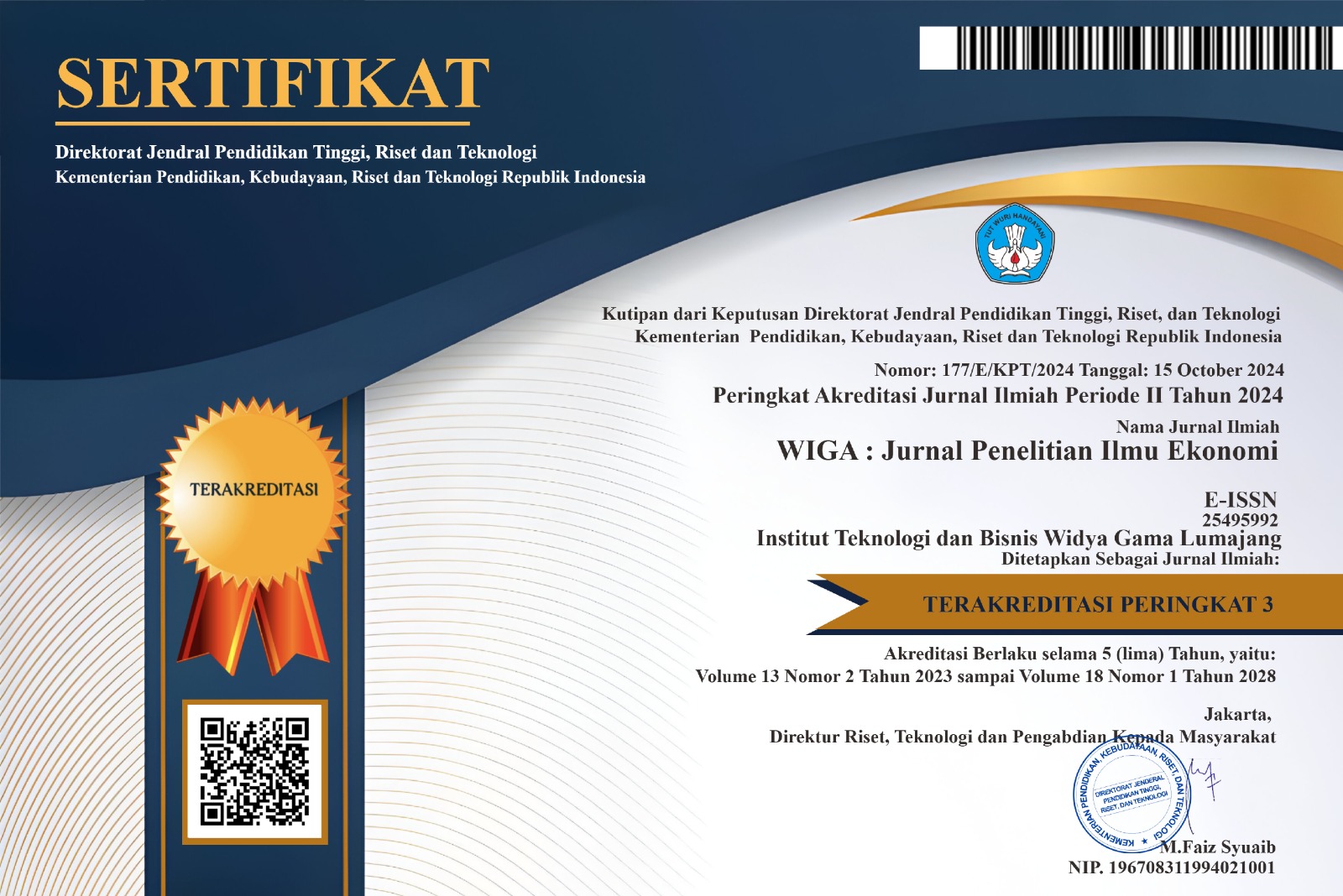The Analysis of Local Regression of Industrial Agglomeration on the Economic Growth in Indonesia
DOI:
https://doi.org/10.30741/wiga.v15i1.1402Keywords:
Agglomeration industry, Economic growth, SMEs, GWPRAbstract
Economic growth is caused by various structural factors, including agglomeration industries and regional spending. This study aims to analyze the influence of industrial agglomeration on economic growth in Indonesia using the Geographically Weighted Panel Regression (GWPR) method. This method analyzes the spatially and temporally varied relationships between dependent and independent variables. This study considers spatial variation to investigate the variability of the economic growth model of each province in Indonesia. This study uses panel data with 34 provinces in Indonesia. Time range from 2017 to 2022. The results of the analysis show that the impact of industrial agglomeration on economic growth varies, with industrial agglomeration having a negative and significant effect on economic growth. Regional spending has a positive and significant influence on economic growth. These findings highlight the importance of policies adapted to regional conditions to maximize the benefits of industrial agglomeration and regional expenditure allocation in supporting sustainable economic growth in various provinces. This research provides important insights for policy makers and academics in designing more effective development strategies based on in-depth spatial analysis.
Downloads
References
Agustin, E., Sasana, H., Jalunggono, G., Ekonomi, F., Tidar, U., Magelang, K., & Tengah, J. (2021). The Effect Of Industry Aglomeration,Work Force, And Wage Level Of Workers On Economic Growth Of Distric/City Incentral Java Province. DINAMIC: Directory Journal of Economic , 3(1), 60–69.
Gunarto, I. A., Susanto, J., Suharsih, S., Ekonomi, F., Bisnis, D., Veteran, U. ", & Yogyakarta, ". (2023). Analisis Aglomerasi Industri, Pengangguran, dan Indeks Pembangunan Manusia Terhadap PDRB Kabupaten/Kota di Provinsi Jawa Barat Tahun 2017-2021. http://ejournal.upi.edu/index.php/JPEI
Lu, H., Li, Q., Liu, B., Chi, Z., & Ye, Y. (2023). Research on the dynamic changes of China’s agro-processing industry agglomeration and spatial impact of production factors on agglomeration. PLoS ONE, 18(12December). https://doi.org/10.1371/journal.pone.0292870
Mankiw. (2007). Makroekonomi Edisi Keenam Terjemahan dari: Macroeconomics (6th Editio). Erlangga.
Rusgiyono, A., & Prahutama, A. (2021). Geographically Weighted Panel Regression With Fixed Effect For Modeling The Number Of Infant Mortality In Central Java, Indonesia. Media Statistika, 14(1), 10–20. https://doi.org/10.14710/medstat.14.1.10-20
Song, M., Gao, Y., Dong, F., & Feng, Y. (2023). Research on the Spatial Spillover Effect of Industrial Agglomeration on the Economic Growth in the Yellow River Basin. Sustainability (Switzerland), 15(5). https://doi.org/10.3390/su15053885
Sugiyono. (2012). Metode Penelitian Kuantitatif, Kualitatif, dan R&D. Bandung: Alfabeta.
Wahyuni Tri, & Striawan Bondan. (2023). Analisis Pengaruh Sektor Industri Pengolahan Dan Aglomerasi Terhadap Pertumbuhan Ekonomi Kabupaten/Kota Di Jawa Timur Tahun 2010-2019. Neo-Bis, Volume 12(No.1, Juni 2023), 16–31.
Wulandari, A., & Hidayati, H. (2021). Aglomeration Analysis Of The Processing Industry On Economic Growth In Bangka Barat District. Integrated Journal of Business and Economics, 5(3), 284. https://doi.org/10.33019/ijbe.v5i3.390
Downloads
Published
How to Cite
Issue
Section
License
Copyright (c) 2025 Edy Santoso, Teguh Hadi Priyono, Duwi Yunitasari, Silvia Anggraini

This work is licensed under a Creative Commons Attribution-NonCommercial 4.0 International License.










